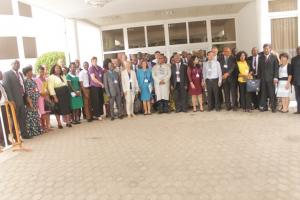Multi-Country Workshop - Ghana Fight Against Epilepsy Initiative (FAEI)
Accra, 06 October, 2015 - WHO in collaboration with the Ministry of Health and the Ghana Health Service organized a Multi-Country workshop from the 15-16 September 2015 at the Ghana Institute for Public Administration at Greenhill, Accra. The workshop themed “Epilepsy care, a shared responsibility” sought to emphasize the fact that one stakeholder cannot do it alone- That Care for people living with Epilepsy is a concerted effort by all stakeholders- health workers, family members, community members including faith-based and traditional healers.
The workshop was to serve as a forum to galvanize partnerships for sustainable improvement in epilepsy care, promote nationwide scale up, as well as to discuss how countries could take forward the Resolution on Epilepsy -WHA68.20 for improving epilepsy care across the continent.
The workshop was attended by policymakers, experts, people living with epilepsy, nongovernmental organizations and other key stakeholders from 21 countries (Belgium, Benin, Burkina Faso, Burundi, Congo Brazzaville, France, Ghana, Kenya, Mozambique, Myanmar, Nigeria, Sierra Leone, South Africa, South Sudan, Switzerland, Tanzania, Togo, Uganda, Viet- Nam, Zambia and Zimbabwe)
Epilepsy, a neurological condition characterized by recurrent seizures, affects more than 50 million people worldwide, 85% of whom live in low- and middle- income countries. In Ghana, over 250 000 people live with epilepsy. Epilepsy treatment is effective for controlling seizures in 70% of all cases. It is inexpensive – the cost can be as low as 5 USD per person per year. Despite this, people living with epilepsy do not receive the treatment they need. Major obstacles faced by people living with Epilepsy include inadequate supplies and poor access to antiepileptic medications; lack of primary health workers appropriately trained to diagnose and treat epilepsy; social stigma, misinformation, traditional beliefs and limited opportunities for specialist training in neurology.
Ghana’s Ministry of Health, and Ghana Health Services, have been working in collaboration with the World Health Organization to address the management of epilepsy throughout the country in the project entitled “Fight Against Epilepsy Initiative”. This four-year project is supported by Sanofi Espoir Foundation. Technical guidance has been provided by the International League Against Epilepsy (ILAE) and International Bureau for Epilepsy (IBE). To reduce the treatment gap, the project aims to integrate epilepsy care into primary health care and reduce stigma through community mobilization. Since the project inception, over 700 non-specialist health care providers have been trained in the management of epilepsy. This has included doctors, physician assistants, nurses, mid-wives and pharmacists. The project has enabled over 4000 people living with epilepsy to gain treatment and has reduced the treatment gap by one-third. Sensitization meetings have been held with faith and traditional healers, and over 20,000 people have been educated on epilepsy as part of community awareness strategies
In his statement during the opening of the meeting the WHO Representative for Ghana, Dr Prosper Tumusiime said that the Resolution WHA68.20 – ‘Global burden of epilepsy and the need for coordinated action at the country level to address its health, social and public knowledge implications’ presents a historical opportunity to improve epilepsy care world-wide. He invited international, regional, national and local partners from within the health sector and beyond to engage in, and support, the implementation of actions to improve care and access to medicines for people living with Epilepsy.
Mrs Caty Forget (Managing Director, Sanofi Espoir Foundation) thanked all the stakeholders for their very strong commitment and perseverance and said “I see on the ground very positive changes, in particular for reducing discrimination and access to care which are among the most difficult challenges to overcome".
The Honourable Minister of Health, Mr Alex Segbefia committing the support of the Ministry said "Ghana is ready to own this project and scale it up to all 10 regions of the country to improve access to quality care and services for people with epilepsy, and raise epilepsy priority on the national health agenda… We believe that the learning that has taken place will be replicated and scaled up in all the regions of Africa and elsewhere.”
During the workshop the WHO/AFRO Document “Epilepsy in the WHO African Region: Scaling up Epilepsy Care” was successfully launched.
______________________________________________
For further information please contact:
Dr ProsperTumusiime, WHO Representative a.i. Ghana, email: tumusiimep [at] who.int (tumusiimep[at]who[dot]int)
Ms Edith Andrews-Annan, EDM Officer, WHO Ghana, email: andrewse [at] who.int (andrewse[at]who[dot]int)
Ms Joana Ansong, Health Promotion Officer, WHO Ghana, email: ansongj [at] who.int (ansongj[at]who[dot]int)



